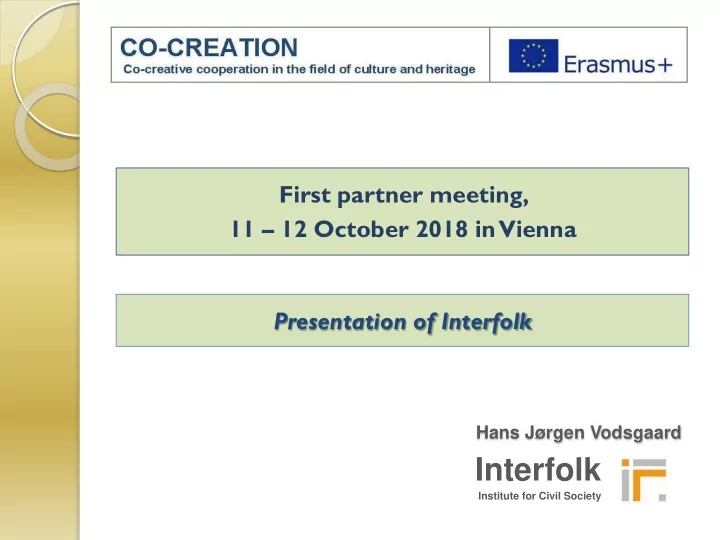

First partner meeting, 11 – 12 October 2018 in Vienna Presentation of Interfolk Hans Jørgen Vodsgaard Interfolk Institute for Civil Society
Interfolk at a glance 2 Interfolk is a non-profit organisation founded in 2008, based on individuals members, sharing an interest in the Grundtvigian tradition of liberal adult education. The mission is to promote democratic learning activities in a civil society context. The activities include research, surveys and development projects, courses, seminars and debate in a Danish, Nordic, and European context. Miro, The wall of the moon, 1958
Membership 3 Interfolk is member of The Baltic Sea NGO Network Denmark International Platform for Citizen Participation (IPCP) Amateo - European Network for Active Participation in Cultural Activities For more information – see www.interfolk.dk Arthur Dove , Distraction, 1928
C ore values and conceptual basis 4 The core values and conceptual basis is based on the Nordic Grundtvigian tradition of liberal adult education as well as the wider European humanistic traditions of Enlightenment and Bildung The association strives to renew and revitalise a critical humanistic paradigm of lifelong learning. Georgia O'Keeffe, Evening star iv, 1917
Mission 5 The mission is to promote Bildung and Enlightenment in the context of liberal adult education and participatory arts and culture. Interfolk strives as part of its mission To create partnerships with Nordic and European associations within liberal adult education, NGO-activities and participatory arts and culture. To ensure that the objectives of lifelong learning adhered to by the European Commission and the Nordic Council of Ministers also continues the best of the intentions of the Nordic-European tradition of enlightenment and Bildung. Grundtvig: To find your song behind the plough
Habermas – Model of Society 6 Technical -instrumental rationality (How - on effective means) market state SYSTEM Democracy Public sphere civil society LIFE WORLD Private sphere Communicative og expressive rationality (Why - on purpose and meaning)
Habermas – Life spheres and life roles 7 System State Market Employee Customer Bourgeois Client Parliament Citizen Citoyen Democratic public Fellowman Civil society L’Homme Person / human Personal sphere Life world The good life implies • A balance between the roles as bourgeois, citoyen and l’homme
Habermas – The system colonises the life world 8 System The neoliberal system T he competitive state New public management Commercialization Instrumentalisation Market State The colonised life world Media: Public service to Infotainment University: Free thinking to Invoices Education: Bildung to competences Culture: Experience economy Spectator democracy NGO’s: private volunteering Civil society is privatised Persons looses autonomy Key words: One-dimensional society Civil society looses learning capacity Life world Citizens looses autonomy Less ” Liberty, equality, fraternity”
Modern man – Neoliberal man 9 Employee Free Employee Client person Consumer Fellow Active human Citizen being Freedom of man (autonomy) Human capital (usefulness) People as political sovereign People as economic work force Keyword – active citizenship Keyword - employability
Paradigm of learning and culture 10 The humanistic agenda for education and culture Universal Declaration of Human Rights, 1948 Article 26. Education shall be directed to the full development of the human personality and to the strengthening of respect for human rights and fundamental freedoms Article 27 Everyone has the right freely to participate in the cultural life of the community, to enjoy the arts and to share in scientific advancement and its benefits
Lifelong learning - paradigm struggle 11 Lifelong: from cradle to grave – Life wide: formal, non-formal and informal learning UNESCO introduced ”lifelong learning” i 1970’s Access to knowledge and culture as a human right Learning for human and democratic development A humanistic paradigm OECD promoted ”lifelong learning” i 1980’s Qualification for competiveness on the global market Learning as an investment in “human capital” A economic-instrumental paradigm Edgar Fauré: Learning to be, 1972 UNESCO: United Nations Educational, Scientific and Cultural Organization OECD: Organisation for Economic Co-operation and Development
Area of activity 12 Interfolk’s activities include research, surveys and development work, courses and debate in a Danish, Nordic, and European context. Development work Courses Debate Management Networking Fund raising Document Research
Partners of cooperation 13 The partners of cooperation are Primarily from the area of civil society, such as liberal adult education organisations, arts & culture associations and other NGO’s; Secondary from the area of public education and culture. We give high priority to multilateral and cross-national partnerships, because they pave the way for new ideas, new forms of activities, a broader inter-face and more funding opportunities. Overview of international projects – see http://interfolk.dk/projects.html
Expectations to the project 14 The partnership circle will complete the work plan successfully. We will all gain new knowhow and skills to promote inclusion, cohesion and trust by strengthening co-creative activities We will strengthen our capacity to offer new in-service training events at a national and European level. We will develop our international network and ability to initiate new international projects in the field. Weie, Faun og nymfe, 1941
Possible organisational and personal benefits 15 Organisational benefits: New inspiration New contacts More funding opportunities Personal benefits New impulses News persons to know New places to visit Munch-Petersen, Red Butterfly, 1935
Recommend
More recommend